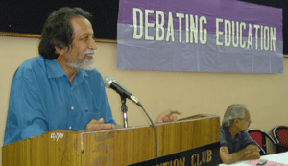 People's Democracy
People's Democracy
(Weekly
Organ of the Communist Party of India (Marxist)
No. 40
October 02, 2005
(Weekly
Organ of the Communist Party of India (Marxist)
|
Vol.
XXIX
No. 40 October 02, 2005 |
SAHMAT-DTF
Seminar Call

Prabhat Patnaik addressing the seminar
THE need for bringing popular pressure on the government to stop it from abdicating its responsibility towards higher education in the country was underscored at a seminar “Debating Education” held by SAHMAT and Democratic Teachers Front at New Delhi on September 24. This popular pressure, through movements, was also necessary to beat back the pro-privatisation ideology-driven judgements of various courts in the recent past. The recent judgement of the Supreme Court on private professional colleges was highlighted for its dangerous implications for the poor, especially the SC/ST sections.
Eminent
economist Prabhat Patnaik chaired the seminar while those who addressed it were
CPI(M) Polit Bureau member Sitaram Yechury, Delhi Democratic Teachers Front
leader Vijender Sharma, economist C P Chandrashekar, scientist Dinesh Abrol,
academics Sukhadeo Thorat, Madhu Prasad, Kamal Mitra Chenoy and advocate Ashok
Agarwal. A booklet titled ‘Debating Education 2 – Commercialisation of
Higher Education; Social Responsibility Versus Private Greed’ containing the
papers presented by these speakers was released on this occasion.
Yechury
reiterated the CPI(M)’s total objection to the Supreme Court’s recent
judgement on private professional education, particularly removal of
reservations in admissions of these colleges. He said the popular pressure over
this retrograde judgement has made the government to commit itself to overcoming
it through central legislation, including if necessary a Constitutional
amendment. He stressed that popular pressure through movements is still
necessary to see that the central government acts on this promise in the
forthcoming winter session of parliament itself. This, he said, was necessary to
put in place necessary rules and regulations so that the judgement does not come
into effect by the next academic year. He said the CPI(M) was insisting for
social control over these professional institutes – in admissions,
particularly through reservations; in the fee structure; and in the content –
so as to ensure access to higher education for the poor and the downtrodden. He
cited the recent convention organised by various dalit organisations on the need
for reservations in private sector as an important step in the fight for that
demand. Yechury expressed total support of the CPI(M) for this demand.
Prabhat
Patnaik in his concluding remarks said what is happening in the form of
government policy regarding higher education is nothing but a bourgeoisie
counter-revolution against the achievements of the national liberation movement,
one of which was the implicit social contract that the State will provide for
education, health and other social welfare needs of the people. He charged that
the judiciary was playing a leading role in this counter-revolution and cited
many instances, including the latest SC judgement. He said one of the main aims
of the ideology behind this attack is to cripple popular movements. He debunked
the argument that there is resource crunch for the State to finance higher
education as an “erroneous argument”. Referring to the prime minister’s
recent exhortation to “aim high” and stop being “timid”, Patnaik said
the PM should realise that a strong higher education system in India with access
for all is definitely something “high to aim for”. He advised one should not
be “timid” to strive for such a high aim. Patnaik concluded by warning that
the changes being ushered in higher education currently will entail social chaos
and produce only people who can cater to metropolitan markets.
C
P Chandrashekar felt that the recent Supreme Court judgement marks the judicial
institutionalisation of the larger trend towards privatisation. The judgement by
emphasising that private institutions are needed in higher education was only
facilitating the withdrawal of the State from this sector. The two main
arguments being cited for this – State does not have resources and the State
must concentrate on primary education instead of higher education – are
fundamentally flawed. He said that the government can easily raise the tax-GDP
ratio which is quite low even when compared to Sub-Saharan countries. He
underlined the need for the State to take on the responsibility of higher
education by mobilising resources and for limiting the private sector
participation to only philanthropic ventures. Chandrashekar expressed concern at
the proliferation of private universities in the country. He saw two trends by
which this was happening: Firstly, by misutilising the ‘UGC - Deemed
Universities Act’ and bestowing to all and sundry “deemed university”
status. Secondly by enacting legislation in the state assemblies, as was
disastrously seen in Chattisgarh.
Vijender
Sharma charged the governments at the centre of consciously promoting
privatisation and commercialisation of higher education. He felt the judiciary
was playing a pro-active role of aiding this effort. He cited how among the
total number of engineering seats available in the country today, 80 per cent
are in private institutions. For example in Andhra Pradesh, out of the 240
engineering colleges in the state a whopping 230 colleges
are self-financing colleges. He noted that even as the loot was
continuing unabated, there have been significant struggles against this trend,
most notable of which was the one led by the Student’s Federation of India
(SFI) in the state of Maharashtra.
Sukadeo Thorat stressed that this commercialisation of education was not merely a reflection of the insensitivity towards the poor but a promotion of an ideology of privatisation, which was a very disturbing aspect. He criticised the Supreme Court judgement for completely bypassing the Directive Principles of our Constitution. With our society being exclusivist and discriminative in nature, the need for State intervention to ensure affirmation of dalits and other weaker sections is greater, said Thorat. If the State withdraws, then education will remain unavailable to the poor and SC/ST sections of people.
(INN)